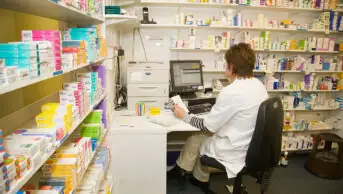
Shutterstock.com
A clinical academic training pathway for pharmacy professionals should be fully implemented by 2030, according to a report commissioned by NHS England.
‘Report of a UK survey of pharmacy professionals’ involvement in research‘, published on 29 February 2024, was produced by a short-life working group established in 2021 to develop the UK’s clinical academic pharmacy workforce and was informed by surveys of individual pharmacy professionals and pharmacy organisations.
The working group, which included representatives from the Royal Pharmaceutical Society (RPS), the General Pharmaceutical Council, NHS England Workforce Training and Education Directorate, the Pharmacy Schools Council and the four UK chief pharmaceutical officers, noted in its report that pharmacy staff “are underrepresented among clinical staff who take up clinical research training opportunities”.
“For example, only 137 of 5,000 applications to the National Institute of Health and Care Research doctoral fellowship between 2014 and 2021 were from pharmacy professionals and, of these, only 23 were successful,” it said.
The survey sought views on research experience among pharmacists and looked at factors that would affect a future clinical academic pharmacy workforce.
Of the 41 pharmacy organisations that responded to the survey, 73% said they supported pharmacists to apply for research training awards, but 75% of 218 individuals who responded to the survey said they had never applied for research training funding.
Individual respondents said that factors including protected learning time, support from employers, funding, support for making research applications and joint projects run between the NHS and a university, would make the biggest difference in helping them follow clinical academic pharmacy careers.
Organisations reported that joint research projects between employers and universities, named contacts to support aspiring researchers and jointly funded posts, such as those between the NHS and a university, would also help people pursue a clinical academic pharmacy career.
To facilitate greater pharmacy involvement in research, the report made short-, medium- and long-term recommendations to “support the embedding of research at all stages of a pharmacy professional’s career”.
These included fully implementing “a clinical academic training pathway for pharmacy professionals” by 2030.
“Comments from both individual and organisational respondents considered that clinical academic practitioner roles must be part of a career pathway so that individuals can see a route to progression and suggested that specific roles linked to schools of pharmacy are required,” the report said.
“The new RPS frameworks, which all include a specific research domain, should be universally embedded across pharmacy careers, from the undergraduate through to postgraduate years, and linked to career progression.”
The report also recommended that job plans should be produced by 2030 for the entire pharmacy workforce, with protected time matched to the level of their research activity.
The report added that “exemplar job plans”, which include protected research time for pharmacists working in both primary and secondary care, should be introduced from 2024.
Commenting on the report, Claire Anderson, president of the RPS, who sat on the working group, said: “We wholeheartedly welcome its recommendations. Research is an essential pillar of professional practice, driving continued professional innovation and advancement in care for patients.
“Professional engagement with research, supported by a network of clinical academics, is vital for the profession’s growth; pharmacists are uniquely placed within the healthcare system to drive forward the evidence base on the safe and effective use of medicines.
“The report’s suggestion to embed RPS curricula frameworks into pharmacists’ job descriptions by 2026 aligns with our mission to integrate research activities across all pharmacy sectors. This initiative will grow a cohort of research-engaged pharmacists ready to lead the pharmacy research agenda.”
Amira Guirguis, chair of the RPS’s Science and Research Committee, said: “The NHS England report on pharmacy professionals’ involvement in research reveals a concerning reality: there is a significant lack of engagement in research within the pharmacy profession. This calls for immediate action to enhance research leadership, cultivate a strong research culture, and address critical knowledge gaps that are essential for improving patient care.
“The COVID-19 pandemic has underscored the urgency of advancing pharmacy research to address emerging healthcare challenges and preparing for future threats. Urgent research is needed to develop new medicines, mitigate risks associated with existing medications and enhance patient safety. Collaborative efforts from academia, industry and healthcare institutions are necessary to identify research priorities and allocate resources effectively.”
- This article was updated on 6 March 2024 to include comment from Amira Guirguis, chair of the RPS’s Science and Research Committee


